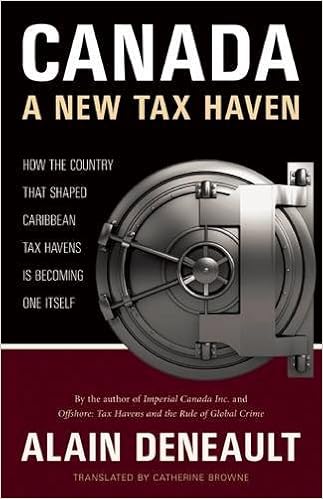Despite all the attention, few Canadians of any prominence were identified in the leak of information connected with 214,000 shell companies.
Is this because Canadians are such good boy scouts and girl guides? Do we obediently accept our collective responsibilities and pay our taxes, while others engage in the seedy world of shell companies, tax evasion and tax havens? It’s a nice idea that fits with our sense of national identity, but unfortunately, it isn’t quite true.
In fact, Canadians were instrumental in establishing a number of Caribbean countries as tax havens starting in the 1960s, as Alain Deneault documents in his book Canada: A New Tax Haven. (more...)
Review:
In Canada: A New Tax Haven, Alain Deneault traces Canada’s relationship with Commonwealth Caribbean nations back through the last half of the twentieth century, arguing that the involvement of Canadian financiers in establishing and maintaining Caribbean tax havens has predisposed Canada to become a tax haven itself – a metamorphosis well under way.
Canada was linked to Caribbean nations long before they became tax havens. In the 1950s, an ex-governor of Canada’s central bank attempted to establish a low taxation regime in Jamaica. In the 1960s, the transformation of the Bahamas into a tax haven characterized by impenetrable banking secrecy was shaped by a minister of finance who sat on the Royal Bank of Canada’s board of directors. A Calgary lawyer and former Conservative Party heavyweight drew up the clauses that transformed the Cayman Islands into an opaque offshore jurisdiction. For years, Canadian politicians have debated annexing tax havens such as the Turks and Caicos Islands, making them part of Canadian territory. Canada has signed a free-trade agreement with Panama and is currently seeking a wider agreement with countries in CARICOM, the Caribbean economic community. And, notably, Canada currently shares its seat at the World Bank and the International Monetary Fund with a group of Caribbean tax havens.
These exercises in fostering fiscal and banking leniency have predisposed Canada to become one of the most attractive tax havens to foreign interests. Not only does Canada offer one of the lowest corporate tax rates in the world, but a number of loopholes encourage companies to relocate to Canada as if it were Barbados or Bermuda.
Canada: A New Tax Haven is an attempt to analyze the situation and address its implications for Canadians.for Canadians.


No comments:
Post a Comment